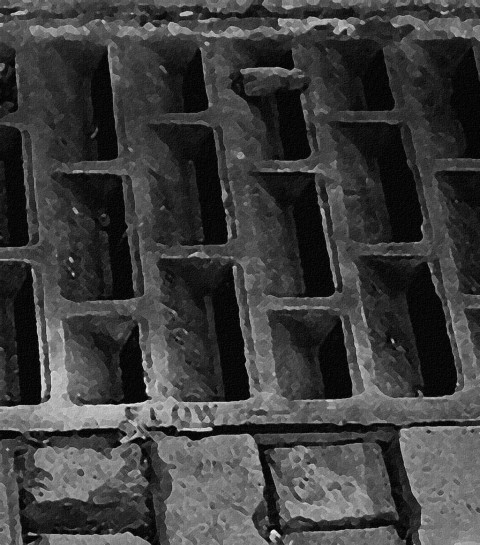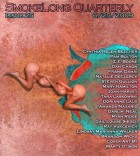His accent was the first thing to go. Figuring as much, he had originally priced it at ten dollars but then thought, No, that’s greedy and ridiculous, and so marked it down to three. His neighbor, Norma Ermbauer, brought it to the table. Norma had moved to the sunbelt from Jersey years ago after her husband died. Clyde used to cut her grass with a pushmower as a kid and was glad she made it to the tables first. She fished three neatly folded dollar bills from a small change purse. You know, kiddo, I’ve always admired this, she confided and stashed her purchase.
It was a Saturday morning and the people came in droves. They tromped from table to table, churning the yard to muck, inspecting the merchandise. Place names proved to be very popular—Sweetwater, Corinth, Cope. He knew antiquers and junkers retrofitted them into table lamps and other such things. One woman approached and asked if he had any frames to go with those place names, and he said no, unfortunately, he didn’t. The same demand held true for family nicknames: they were all hot items, delighted in as kitschy collectibles. Uncle Bum, Uncle Butch, Little Billy. Sunlight flashed from beat-up hatchback as it trolled away, and he saw Aunt Woosie’s moniker dangling from the rearview mirror—snatched up by a sorority girl—swinging with a string of plastic Mardi Gras beads. A few of his more exotic idioms were purchased from the discount bin for twenty-five cents a pop. Anecdotes, organized in the umbrella stand, went for more.
He answered a few questions politely but mostly smiled and stayed at the card table. A beige lockbox rested by his elbow, its key on a hemp string around his neck. His mother proved an interesting challenge. After some thought, he went to the kitchen window and placed a mark-up sticker on the glass where she stood at the sink, seeding bell peppers and watching the Gamecocks lose on TV. (Along with a 3×5 notecard which read: Authentic 5th generation local—30 year mill worker, single mother, 1 missing finger—must have rare find!) As she was carted off like a piece of garden statuary, she looked to her son, heartbroken and confused, the bright little paring knife still dangling from her grip. He tried to give her a reassuring smile (though his chest felt like a sandbag losing its sand) and called out miserably: I love you, Ma! It’s okay! I love you! Two production assistants hefted her away, shifting their tall paper cups of latte to different hands for a better grip. As they left, one beamed and whispered to the other, Doesn’t she look like Paula Dean?
By the time evening set a low boiling sun against the trees, he had sold the blue ostrich leather boots off his feet and even his full name for two bucks. The crowd had all dispersed, leaving fresh tire tracks in the turf. Norma shuffled from next door with a mug of hot tea. Quite a haul, kiddo, she said, sipping at the rim while he counted the money.
I was so proud of this stuff, he said, that I used to give it away for free. He folded the cash and gently closed the lid: $873.25. Let me share something with you, Norma. He rested delicately on the edge of the card table and proceeded to tell her about the time, when he was eight years old, that he hooked a baby alligator on his bobber at the South Carolina No Name Lake—well, hooked wasn’t really the right word, the thing bit the bobber and clamped on tight. Half the adults on the dock were shouting for him to reel it in and half were shouting for him to throw the rod in the water, and eventually his mom ran up with a pair of kitchen sheers and cut the line. Snip. That clean. And on the drive back home they stopped at an Esso station and he had his first taste of Cheerwine. And he had loved the word: Cheerwine, Sheerwine, Shewhine. He repeated it like an incantation from the backseat of their station wagon well past sunset.
When he was finished, Norma suddenly realized what he was doing and placed a hand against his chest, and said, Oh, kiddo, for Pete’s sake, don’t be so stupid. I can’t take this. Keep it with you. You’ll want it.
He nodded in consent, and when they hugged goodbye, he slipped the story into her back pocket unawares. It was his last one.
After Norma left, he took one final look at the remaining junk people hadn’t bought—mostly idiosyncratic stuff, like the rusty swingset where he split his head in the fifth grade, or the ORA water fountain that always tasted like dirty pennies—but they didn’t make sense without the other things, so he bagged it all together, cinched them with twist-ties, and left it with the card table as trash by the curb. He then strolled down the street barefoot, carrying the lockbox with the $873.25 inside, and threw it down the storm drain on the corner. His clothes went in after, peeled off one at a time. Finally, the tiny key plinked down the metal pipes. Not a stitch was left, not even his name.



 The core workshop of SmokeLong Fitness is all in writing, so you can take part from anywhere at anytime. We are excited about creating a supportive, consistent and structured environment for flash writers to work on their craft in a community. We are thrilled and proud to say that our workshop participants have won, placed, or been listed in every major flash competition. Community works.
The core workshop of SmokeLong Fitness is all in writing, so you can take part from anywhere at anytime. We are excited about creating a supportive, consistent and structured environment for flash writers to work on their craft in a community. We are thrilled and proud to say that our workshop participants have won, placed, or been listed in every major flash competition. Community works.